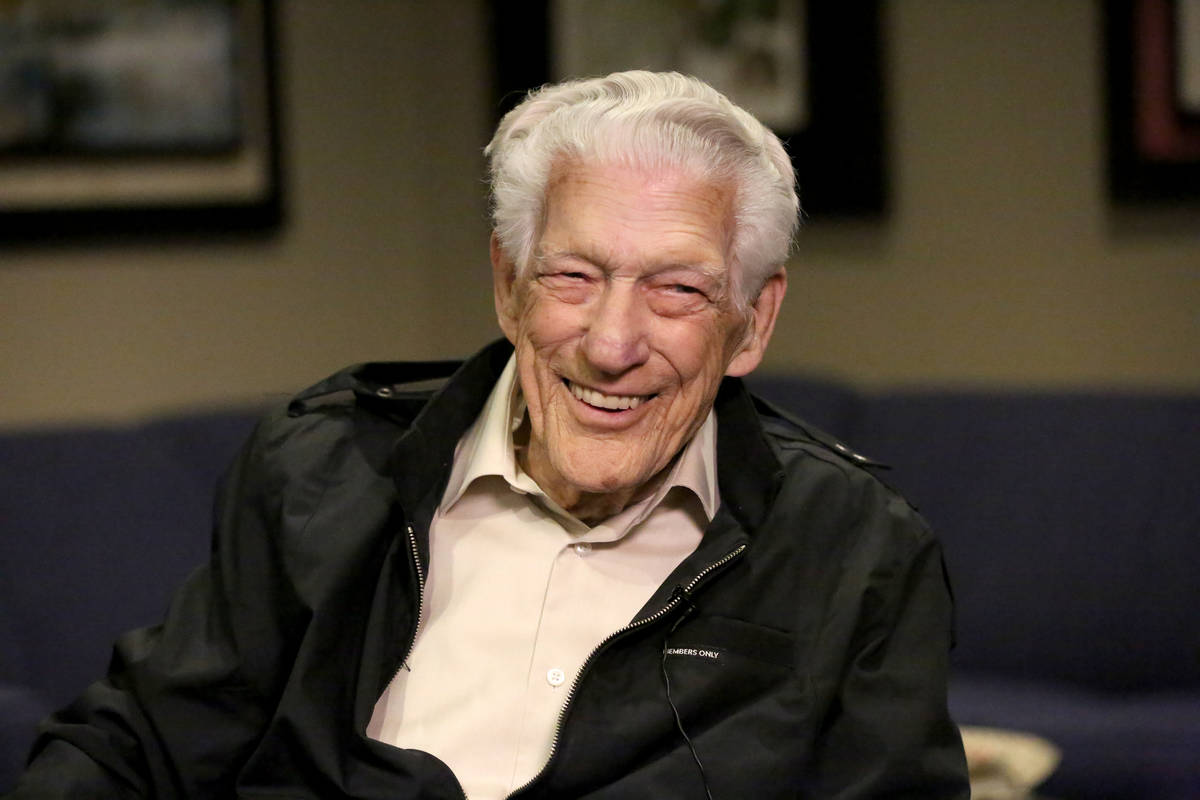Last known Pearl Harbor survivor in Nevada dies

The last known Pearl Harbor survivor in Nevada, who died early Wednesday, was just a fresh-faced 18-year-old in the U.S. Army Air Corps when Japan launched a surprise attack on U.S. forces.
In a recent interview with the Las Vegas Review-Journal, Ed Hall stressed the importance of teaching children about the day that President Franklin D. Roosevelt said “will live in infamy.”
The attack left 2,403 Americans dead, including 68 civilians, and Hall told the Review-Journal in previous interviews that it was a day he would never forget.
“It’ll be forgotten, just like the Civil War, or the Spanish American War,” Hall predicted. “This country better wake up or it’s going to happen again, that nobody will pay attention to the warning signs, like that day of December 7, 1941.”
Hall, who was 99, died at about 2:45 a.m. Wednesday at the North Las Vegas VA Medical Center, according to his longtime friend Greg Mannarino, who had Hall stay in his Las Vegas home for years.
“He passed away peacefully in his sleep,” said Mannarino, who visited him Tuesday evening. “He joked with the nurses last night. Before I left he said ‘I love you.’ He seemed still full of life. The doctor told me that ‘When we went to check on him, he was unresponsive.’ I just fell over completely. He was the greatest guy, from the greatest generation. Those men were cut from a different cloth.”
In an interview in August 2020, Hall told the Review-Journal that he was saddened to hear that he was believed to be the last living Pearl Harbor survivor in the state.
Throughout his life, he dedicated himself to keeping the memory alive and was one of the last presidents of the disbanded local chapter of the Pearl Harbor Survivors Association.
Hall said members used to give talks at Clark County schools “to keep the children updated on history.”
That ended a few years ago when he never received a response from the Board of Education to the annual offer.
“I never got a reply, they never answered my letter, and from there on it just seemed like we didn’t exist as far as they were concerned,” he said. “They didn’t want any part of us.”
‘What the hell’s going on?’
Hall was on kitchen duty on Dec. 7, 1941, at Hickam Field (now Joint Base Pearl Harbor-Hickam), cleaning a frying pan, when the former Army private heard a loud thud that he thought might be a malfunctioning air compressor.
He stepped outside the mess hall and took in a scene of unimaginable chaos as explosions and flames erupted around him under skies full of Japanese Zeroes. Then a nearby hangar blew up, sending men fleeing.
“What the hell’s going on?” he remembered shouting at one of them as he became aware there were dozens of airplanes flying overhead.
The man pulled him under the eave of a barracks, shouting, “Do you want to die?”
“There was shooting going on like you wouldn’t believe,” Hall said of the moment he realized they were under attack. “I’m still amazed I didn’t get hurt.”
One low-flying plane shot 2 inches off the roofing Hall and his comrade were crouching under. In the distance, he heard a loud explosion and saw a dark cloud, which he later learned was the USS Arizona being struck. It quickly sank, killing 1,177 sailors and Marines.
“She’ll never be decommissioned,” he said of the ship that is now a maritime memorial. “Her crew is still aboard.”
After gathering his wits, Hall jumped into a pickup and began driving around the base, resolving to save as many of the wounded as he could.
For hours, he drove two to three people to the hospital at a time. On one trip out to pick up more survivors, a stream of bullets tore through the cab, shattering the windshield but miraculously missing him and the medic in the passenger seat who had joined him.
On two flat tires, Hall drove back to the motor pool to change them out.
At one point, Hall stopped to check on a number of downed Americans. When he rolled one over to check his pulse, the man’s intestines spilled out. Hall grabbed the man’s .45 automatic pistol and strapped it to his waist. He needed a weapon.
Though he didn’t fire it that day, he kept it.
Hall enlisted in the Army in 1939 at age 16, lying about his age. When he was discharged in 1946 at 23, he tried to go back to school but was turned away.
Getting a diploma
In those days, there were no adult education or GED certificate programs. Disappointed but seeing no other options, Hall moved on. He got married, fathered a son and stepdaughter and in 1950 moved to Chicago, where he worked as an elevator installer for 40 years. He retired to Las Vegas in 1994.
In November 2017, he finally received his high school diploma. The diploma arrived from Greenwood, South Carolina, bearing Hall’s name. To make his graduation happen, it took about nine months of poking and prodding different officials, including a state legislator, by fellow members of Daylite Masonic Lodge No. 44 in Las Vegas.
“I am just overwhelmed to know that I am now a high school graduate,” he told the Review-Journal at the time, gripping a framed diploma. He said education was the most powerful thing in the world and that there was just one thing left on his bucket list: To live to be 100.
“If I can do that, that’ll fill the bucket,” he said.
Contact Briana Erickson at berickson@reviewjournal.com or 702-387-5244. Follow @ByBrianaE on Twitter. Staff writer Jeff Burbank contributed to this story.